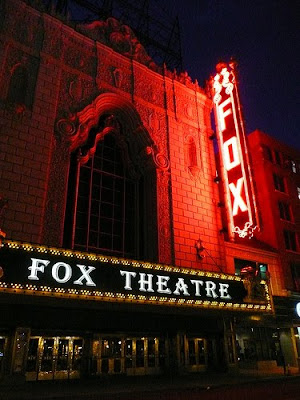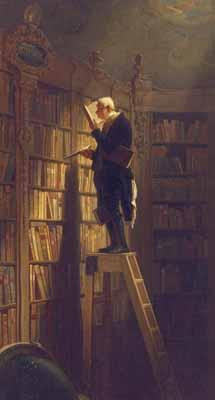
Having recently been to see Avatar (and both liked it and disliked it), I’m thinking I need to start keeping track of movies as well as books. The fact is, I love movies. The only time I use our brand new flat screen TV (which I have yet to figure out how to operate) is when I have time to watch something from our Netflix queue . Even so, my favorite way to enjoy a movie is in a theater. And oh, how I wish I lived back in the era of those opulent movie theaters – the ones with the brightly lit marquees and the ticket booths where you bought your tickets from a foxy-looking lady with a fancy hairdo, and milled around in lushly carpeted lobbies with chandeliers overhead, before being led to your seat by an usher with a flashlight in his gloved hand and a little pillbox hat on his head.
 I remember going on a date to one of those grand old theaters in St. Louis, Missouri years and years ago. I think the movie was Whatever happened to Baby Jane and afterwards we had dessert at a restaurant called “Cyranos” - the most elegant and romantic place I’d ever been taken to on a date. I have no idea who I was with that night. Can’t remember anything at all about him. But I do remember the movie theater and the restaurant and the fact that I ordered the most outrageous thing on the menu, cherries jubilee, along with a strange, unheard of coffee drink called cappuccino.
I remember going on a date to one of those grand old theaters in St. Louis, Missouri years and years ago. I think the movie was Whatever happened to Baby Jane and afterwards we had dessert at a restaurant called “Cyranos” - the most elegant and romantic place I’d ever been taken to on a date. I have no idea who I was with that night. Can’t remember anything at all about him. But I do remember the movie theater and the restaurant and the fact that I ordered the most outrageous thing on the menu, cherries jubilee, along with a strange, unheard of coffee drink called cappuccino.But I digress. I was saying that I wished I lived back in the era of the elegant old movie theaters, instead of the huge ugly, aesthetically challenged multiplex warehouses that have replaced them. On second thought, I’m not so sure that I would want to sacrifice the level of sophistication and artistry apparent in so many of today’s movies, just for the fun of watching a huge velvet draped curtain rise above a much smaller silver screen. Film has been an art form for a long time, but these days the technical wizardry that is a large part of the movie making process has created a whole new kind of movie experience. For viewers, these kinds of movies – and Avatar is a good example - come across as a combination of art and....magic. Or at least that’s the way it seems to me.
There’s always been a magical element to what movies are capable of doing by drawing us into imaginary worlds even when those worlds are based on historical fact or contemporary experiences. But in the past we were probably a lot more aware of the part we had to play in going along with the magic. We knew that the half man half fish monster (Creature from the Black Lagoon) was just a big fake, as were the alien creatures and aircraft that showed up in so many early science fiction movies. Even when a trembling Jessica Lange was scooped off the street by a much more realistic version of King Kong than the 1933 version we could still spot the artifice if we tried. But we were willing to play along because movies could only go so far with the game of let’s pretend. We had to to do our part because otherwise I think we knew that the magic wouldn’t have worked. It’s different now. The magic is much stronger. It certainly was in Avatar.
British science fiction writer, Arthur C. Clarke, famous for collaborating on the film, 2001: A Space Odyssey, once said “Any sufficiently advanced technology is indistinguishable from magic.” While that’s probably true of everything from ipods to flat screen television sets, I think it’s particularly applicable to the movie Avatar. Anyone who has seen the film will understand why. First of all there were the Na’vi, those 10 foot tall skinny blue people with long tails and huge eyes in their glittery faces who looked and behaved as if they were every bit as real as the humans in the story.
Then there was Pandora - the world inhabited by the Na’vi, a breathtaking paradise of a place filled with beautiful plants and strange living things that glowed in the dark, giant trees, forests of clouds and all sorts of creatures, including enormous dragon like birds and heavily armored beasts capable of being tamed and used for transportation.
All this was quite magical and this was what I thought was so dazzling about the movie. Unfortunately, though, by the time I got to the end of the film I wasn’t so sure I could say I really liked it that much after all. Because while technically stunning, in the end that’s all there was to Avatar. It was technically stunning. There might have been a chance to deal with some compelling themes (industrial and material greed vs. protection of the environment; colonialism and exploitation vs. respect for indigenous cultures, plurality vs. dualism, balance and harmony, spiritual interconnectedness, and so forth) but it never happened. It was as if the filmmakers knew they needed a context for using the technology available to them and so they cobbled together a story so flimsy and predictable that I can’t imagine how anyone would want to take credit for coming up with it. But it didn't take me long to come to the conclusion that what was being passed off as a story had simply been thrown together in order to use the technology. As far as I’m concerned, in a truly great film it’s the other way around.
The other problem I had with Avatar is the same one I have with many other movies being made today. There were just too many scenes featuring huge, clunky robots that stomp around (or in some cases fly around) causing things to explode in spectacularly noisy bursts of fire.
I’ve noticed that scenes like these seem to have become the hallmark of many contemporary films. In fact it’s almost become a cliche that keeps showing up again and again in movies: big metal thing clanks into the picture...bursts of fire come shooting out...people run screaming into the distance...cars, planes, buildings exlode...noise and mayhem reigns. Why this has become so appealing is beyond me. (Perhaps it has something to do with why so many children have to be warned not to play with fire.) At any rate, these kinds of stock scenes kept appearing over and over again in Avatar and by the time the movie ended I left with one thumb firmly pointing down - despite all the magic that had impressed me.


















